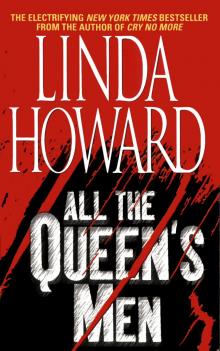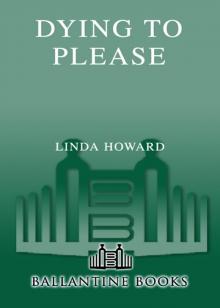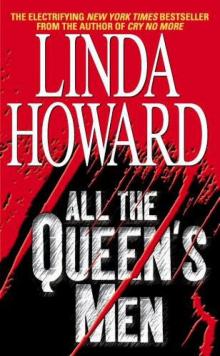- Home
- Linda Howard
Shadow Woman: A Novel Page 2
Shadow Woman: A Novel Read online
Page 2
—and stared into the face of a stranger.
The damp towel slid from her suddenly nerveless fingers, puddling on the floor at her feet.
Who is that woman?
It wasn’t her. Lizette knew what she looked like, and this wasn’t her reflection. She whirled wildly around, looking for the woman reflected in the mirror, ready to duck, ready to run, ready to fight for her life, but no one was there. She was alone in the bathroom, alone in the house, alone—
Alone.
The word whispered through her mind, a ghost of a sound, barely registering. Turning back to the mirror, she fought through confusion and terror, studying this new person as though she were an adversary rather than … rather than what? Or, who?
This didn’t make sense. Her breathing came in swift, shallow gulps, the sound distant and panicked. What the hell was going on? She didn’t have amnesia. She knew who she was, where she was, remembered her childhood, her friend Diana and her other coworkers, what clothes were in her closet and what she’d planned to wear today. She remembered what she’d had for dinner the night before. She remembered everything, it seemed—except that face.
It wasn’t hers.
Her own features, what she saw in her mind, were softer, rounder, maybe even prettier, though the face she was looking at was attractive, if more angular. The eyes were the same: blue, the same distance apart, maybe a little deeper-set. How was that possible? How could her eyes have gotten more deep-set?
What else was the same? She leaned closer to the mirror, looking for the faint freckle on the left side of her chin. Yes, there it was, where it had always been; darker when she’d been younger, almost invisible now, but still there.
Everything else was … wrong. This nose was thinner, and more aquiline; her cheekbones more prominent, higher than they should have been; her jawline was more square, her chin more defined.
She was so completely befuddled and frightened that she stood there, paralyzed, incapable of any action even if one had occurred to her. She kept staring into the mirror, her thoughts darting around in search of any reasonable explanation.
There wasn’t one. What could account for this? If she’d been in an accident and required massive facial reconstruction, while she might not remember the accident itself, surely she’d remember afterward, know if she’d been in a hospital and undergone multiple surgeries, remember the rehab; someone would have told her about everything, even if she’d been in a coma during her recovery. But she hadn’t been in a coma. Ever.
She remembered her life. There hadn’t been any accident, except for the one when she was eighteen that had killed her parents and turned her world completely upside down, but she hadn’t been in the car; she’d dealt with the aftermath, with the crushing grief, the sense of floating untethered in the black space of her life with all of her former security gone in the space of a heartbeat.
She had that same feeling now, of such unfathomable wrongness that she didn’t know what to do, couldn’t take in all the meanings at once, couldn’t grasp how fully this affected everything she knew.
Maybe she was crazy. Maybe she’d had a stroke during the night. Yes. A stroke; that would make sense, because it could screw with her memory. To test herself, she smiled, and in the mirror watched both sides of her mouth turn up evenly. In turn, she winked each eye. Then she held both arms up. They both worked, though after showering and washing her hair she thought she’d have already noticed if either of them hadn’t.
“Ten, twelve, one, forty-two, eighteen,” she whispered. Then she waited thirty seconds, and said them again. “Ten, twelve, one, forty-two, eighteen.” She was certain she’d said the same numbers, in the same sequence, though if she’d had a stroke would she be in any shape to judge?
Brain and body both appeared to be in working order, so that likely ruled out a stroke.
Now what?
Call someone. Who?
Diana. Of course. Her best friend would know, though Lizette wasn’t certain how she could possibly phrase the question. Hey, Di; when I get to work this morning, look at me and let me know if I have the same face today that I had yesterday, okay?
The idea was ludicrous, but the need was compelling. Lizette was already on her way to the phone when sudden panic froze her in mid-step.
No.
She couldn’t call anyone.
If she did, they would know.
They? Who were “they”?
On the heels of that thought she was suddenly drenched in sweat, and nausea convulsed her stomach. She lurched back to the bathroom, barely making it to the toilet in time before she couldn’t hold back any longer. After throwing up the small amount of coffee she’d drunk, she clutched her stomach as dry heaves seized her body and wouldn’t let go. Sharp pain stabbed behind her eyes, so intense that tears blurred her vision, ran down her cheeks.
When the convulsive vomiting stopped, she weakly sat down on the cool bathroom floor and reached for the toilet tissue to mop her eyes, blow her nose. The terrible pain behind her eyes eased, as if an internal vise were being loosened. Panting, she closed her eyes and let her head drop back until it rested against the wall. She was so tired it reminded her of how she’d felt after just finishing a 30K run.
30K? How would she know what running thirty kilometers felt like? She wasn’t a runner, never had been. She walked on occasion, and when she was a kid she’d done some riding, but she wasn’t a fitness nut by any means.
The stabbing pain behind her eyes was back, and her stomach rolled. She sucked in air through her mouth, willing herself not to start heaving again. Putting her fingers on the inside corners of her eyes she pushed hard, as if she could force the pain out. Maybe the pressure worked; the stabbing eased, just as it had before.
The nausea and headache were kind of comforting, though. Maybe she was just sick. Maybe she had a weird virus that was making her hallucinate, and what she thought she was seeing in the mirror was just that: a hallucination.
Except she didn’t feel sick. And that was strange, because she’d just thrown up so violently her stomach muscles ached, and she’d had that piercing headache, but she didn’t feel sick. Now that it was over with, she felt perfectly well.
She also felt annoyed. Her schedule was completely shot; by now her hair should be dry, and her makeup on. She hated when anything disrupted the timeline she’d laid out for herself; she was so regimented, she made a Swiss watch look harumscarum—
Wait a minute. Regimented? Her? When had that happened? It felt wrong, as if she were thinking of someone else entirely.
Abruptly she was retching again; she surged to her knees and bent over the toilet, choking, her stomach rolling, saliva dripping from her open mouth. This time the stiletto of pain behind her eyes was blinding. She gripped the edge of the sink beside her, holding on to prevent herself from collapsing on the floor—or headfirst into the toilet. Even as awful as the nausea and pain were, somewhere deep inside she felt an incongruous tickle of humor at the idea.
The spasms gradually faded and now she did collapse, but at least it was on her ass on the floor. Leaning back against the vanity, she tilted her head back and closed her eyes, mentally watching the pain pull back like a visible tide.
Obviously, she had to have some kind of bug. Just as obviously, no way could she go to work. Not only did she not want to make a spectacle of herself dry-heaving all over the place—or worse, wet-heaving—she didn’t want to give this to anyone else. After they recovered, they’d probably be after her with torches and pitchforks.
This was crazy. She didn’t think this way, about toilet-diving being funny, or about mobs with pitchforks. She thought about work, and her friends, and keeping the house clean and her laundry done. She thought about normal stuff.
Pain twinged again, not as sharp, not blinding, but there behind her eyes. She froze, waiting for the beast to grab her. Her stomach rolled, then calmed; the pain faded.
She needed to call in sick, the first time she’d
done so since she began working at Becker Investments. Her department head, Maryjo Winchell, had a company-issued cell phone for this type of thing, and, being the careful type she was, Lizette had programmed Maryjo’s number into her own cell phone.
They would know.
The eerie words echoed through her brain again and Lizette tensed, but this time they weren’t followed by debilitating pain and nausea. Why hadn’t it happened now?
Because she’d had that thought before.
Yes. The answer felt right. She didn’t know why, because on the surface it was both stupid and paranoid, but—yes.
Okay. The best thing to do, then, was to not let people know she’d flipped out, and just act normal—sick, but normal.
She got her cell phone from the table where she’d left it, and turned it on. She always turned it off at night, because … She didn’t know why. No answer came to mind; she just did.
When the phone had booted up, she scrolled through her contacts until she found “Maryjo,” selected the number, and hit the green call icon. She heard ringing almost right away, but she’d read that the first couple of rings were placebo rings, put in place so the caller would think something was happening, when in reality the connection took a few seconds longer to happen. She tried to think where she’d read that, and when, but came up blank. Maybe it no longer held true; cell phone technology changed so fast—
A click, and “This is Maryjo” sounded in her ear. Lizette was so caught up in thinking about cell-phone technology that for a second she was blank, trying to remember why she’d called. Sick. Right.
“Maryjo, this is Lizette.” Until she spoke, she hadn’t realized how ragged she sounded, her voice thick from throwing up, her breath still too fast. “I’m sorry, I won’t be able to make it to work today. I think I have a bug. Trust me, you don’t want me spreading it around.”
“Throwing up?” Maryjo asked sympathetically.
“Yes. And a splitting headache.”
“A stomach virus is going around. My kids had it last week. It lasts about twenty-four hours, so you should feel better tomorrow.”
“I hate that it’s such short notice.” Though how she could have anticipated getting sick, she didn’t know.
“Not your fault. This is the first sick day you’ve had in three years, so don’t sweat it.”
“Thanks,” Lizette managed to say. Something rang an alarm bell deep in her mind, something that felt as if there was something else—Her stomach lurched. “I’m sorry, I have to run—” And she did, stumbling, gagging. She hung over the toilet and awful choking noises tore out of her throat, but there was nothing else to come up.
By the time she could catch her breath, every muscle was trembling. Straightening, she held on to the vanity for a moment, then turned on the cold water in the sink. Bending over, she splashed water over her hot face, over and over again until she felt calmer and could breathe without a hard ragged edge tearing at her throat.
Better. This was better. But she didn’t let herself look at the stranger in the mirror; instead she closed her eyes and just stood there for a moment. Finally she grabbed the towel and blotted the water from her eyes, swiped it across her face and neck.
Her heart was still pounding. What on earth had set off this last bout? Was it something Maryjo had said? Nothing jumped out at her, yet she distinctly remembered that sense of alarm, as if Maryjo had ventured into dangerous territory. She mentally replayed the conversation, trying to find anything out of whack, even something trivial. Maryjo’s kids had had a stomach virus, it had lasted about twenty-four hours, blah blah blah. There literally was nothing else, except for the comment about how long it had been since she’d taken a sick day.
Pain streaked through her head like a warning shot. She gripped the edge of the sink and waited it out, trying to keep her mind clear of thoughts, and the pain faded.
Okay.
Something nagged at her, something she felt she should remember but that stayed maddeningly at the edge of—
No. There it was. And so trivial. Exactly when had she last taken a sick day?
She hadn’t, not that she could remember. Not in the entire five years she’d worked at Becker Investments. So why had Maryjo said she hadn’t taken a sick day in three years? When had she been sick? Surely she’d remember, because she was almost never sick. The few times she had been really stuck in her memory, such as when she was twelve and picked up a gross, nasty bug at summer camp that totally knocked her on her keister. She didn’t even catch the normal assortment of head colds that circulated around the office every winter.
So when, other than now, had she ever been absent from work?
She thought back to when she started work at Becker.
This time the pain simply exploded in her head and nausea twisted her stomach. She hung over the toilet, heaving and gasping—and while she did so, she dropped her cell phone on the floor and stomped on it, breaking it apart.
That was insane. And yet—the impulse to destroy her cell phone was so strong that she’d simply acted on it, without hesitation, without question.
When she got control again, she first blew her nose, then splashed more cold water on her face, as she fought for a logical explanation.
There was none. She couldn’t remember ever being sick enough to be out of work, but that wasn’t what had made her insides curdle with fear. She felt as if a stranger were fighting her for control of her body, and sometimes the stranger won.
Whatever was going on, whether she was having a complete mental breakdown or there really was something colossally off, she’d find out, and she’d deal with it.
Until then, she could only go with her instincts, such as stomping the cell phone to smithereens. She felt almost painfully foolish, but—
Maybe not.
She looked down at the cell phone. Just in case it was still working, she said, “Oh, crap,” in her ragged voice, and picked up the little plastic carcass. “Now I have to buy a new phone.” Then she popped out the battery to be certain it was dead, and dropped both the phone and the battery in the trash. After a second she fished the pieces out, put them in the sink, and ran water over them before once again dumping everything.
She was so scared she didn’t know what to do next, but what frightened her most of all was the realization that she didn’t remember starting work at Becker Investments.
Chapter Two
Xavier got up before dawn and ran his usual five miles. He liked running in the relative cool of darkness; not only was it more comfortable, occasionally it offered some chance entertainment: once some shit-head had made the serious mistake of trying to mug him, and had finally managed to crawl away with nothing more serious than a few cracked ribs, some crushed fingers, and Xavier’s size eleven-and-a-half track shoe planted halfway up his ass. He’d considered breaking the shit-head’s neck, just to make the citizens of D.C. a little safer, but bodies could lead to complications so he’d refrained. There had been a few other interesting moments, but in general, once the shit-heads got a good look at him, the smart ones would back away and let him run in peace.
He was a big man, pushing six-four, and muscled in a way that had little to do with a gym and a lot to do with staying alive in all sorts of going-to-shit situations. He could swim ten, fifteen miles, and run twice that many, while carrying up to a hundred pounds of equipment. He could fly a helicopter, pilot a boat, and he’d had so many hours of weapons training that almost any weapon fit his hand as naturally as his own skin. It wasn’t his size, though, that made would-be muggers think twice; it was the way he moved, the hyper-alert vigilance of a predator—not that any muggers would ever think in those terms. Their survival instincts would more than likely whisper, “bad dude,” and they’d decide to wait for a more likely victim. Xavier was a lot of things; victim wasn’t one of them.
He was back home by five thirty, and twenty minutes later he was already showered and dressed, which today meant jeans and boots, and a black
tee shirt. The color of the tee shirt changed from day to day, but the rest of it was pretty much standard. “Dressed” meant he’d also checked his weapon, then situated his holster so it rode his right kidney. The big Glock wasn’t the only weapon he carried, but it was the only one that was readily visible. Even in his own home—perhaps most particularly there—he was always armed with two or more weapons, and never more than a step away from others in his private arsenal.
He didn’t feel paranoid; most of the other black ops people he knew did the same. Home was a point of vulnerability, for him and for everyone in the business, because it was a fixed point. People who stayed on the move were much harder to target. The good news was that, as far as he knew, no one was gunning for him … yet. The “yet” was always there, acknowledged but unspoken.
Because of that, he’d taken the precaution of buying two condo units, side by side. One was in his name; the other was in the name of J. P. Halston. If anyone checked deeper, they’d find that the “J. P.” stood for Joan Paulette. A lot of single women went by their initials. Joan had a social security number and a bank account, paid her maintenance and utility bills on time, and had no love life at all. He knew because he was Joan and she didn’t really exist, except on paper. Currently, his and Joan’s love lives had a lot in common, which was a real pisser, but that was reality and he could deal.
He slept in one condo and kept the other as a safety valve; he’d installed a hidden door, which could be opened only with the fingerprint of his left little finger, in the back-to-back closets linking the two. He’d put other safety measures in place as well, because someone in his line of work couldn’t be too careful. He hoped to God most of them were a waste of time, because if he ever really needed them, then it meant he was chin-deep in a world of shit. His particular skill set was valuable because he was both bold and careful, an attitude he applied to his private life as well as his work.
The powers that be were stupid as hell if they didn’t expect that, so he operated under the premise that they did. He felt more comfortable when everyone—within a limited circle—knew what everyone else was doing. Probably that was why he was still alive; they figured he’d set a trigger to expose them if they ever made a move against him. In that case, they were one hundred percent correct. That didn’t mean they wouldn’t someday try to find a way around, over, or under the situation; when that happened the political shit-bomb would be about to explode and everyone would be scrambling to survive, which was the exact situation he watched for. He’d known the price going in and had judged the end result worth the cost. Unfortunately, the cost had turned out to be higher than he’d expected.

 Mr. Perfect
Mr. Perfect All the Queen's Men
All the Queen's Men Midnight Rainbow
Midnight Rainbow Diamond Bay
Diamond Bay Dying to Please
Dying to Please The Woman Left Behind
The Woman Left Behind Come Lie With Me
Come Lie With Me Drop Dead Gorgeous
Drop Dead Gorgeous To Die For
To Die For Ice
Ice Overload
Overload Shadow Woman
Shadow Woman Veil of Night
Veil of Night White Lies
White Lies Son of the Morning
Son of the Morning The Complete Mackenzies Collection
The Complete Mackenzies Collection Lake of Dreams
Lake of Dreams DeathAngel
DeathAngel Loving Evangeline
Loving Evangeline Burn
Burn Mackenzie's Magic
Mackenzie's Magic Against the Rules
Against the Rules Burn: A Novel
Burn: A Novel A Lady of the West
A Lady of the West Almost Forever
Almost Forever Open Season
Open Season Now You See Her
Now You See Her Prey
Prey Cry No More
Cry No More Sarah's Child
Sarah's Child Angel Creek
Angel Creek Death Angel
Death Angel Kill and Tell
Kill and Tell The Touch of Fire
The Touch of Fire Raintree: Inferno
Raintree: Inferno Killing Time
Killing Time Cover of Night
Cover of Night Tears of the Renegade
Tears of the Renegade Heartbreaker
Heartbreaker The Cutting Edge
The Cutting Edge All The Queen's Men cs-2
All The Queen's Men cs-2 Veil of Night: A Novel
Veil of Night: A Novel Blood Born
Blood Born The Complete Mackenzie Collection
The Complete Mackenzie Collection Mackenzie's Magic m-4
Mackenzie's Magic m-4 Mackenzie's Pleasure m-3
Mackenzie's Pleasure m-3 Raintree
Raintree A Game Of Chance m-5
A Game Of Chance m-5 Prey: A Novel
Prey: A Novel Lethal Attraction: Against the RulesFatal Affair
Lethal Attraction: Against the RulesFatal Affair The Raintree Box Set: Raintree: InfernoRaintree: HauntedRaintree: Sanctuary
The Raintree Box Set: Raintree: InfernoRaintree: HauntedRaintree: Sanctuary The Woman Left Behind: A Novel
The Woman Left Behind: A Novel Dream Man
Dream Man Frost Line
Frost Line Kill and Tell cs-1
Kill and Tell cs-1 Shadow Woman: A Novel
Shadow Woman: A Novel Mackenzie's Mission
Mackenzie's Mission Strangers in the Night
Strangers in the Night Running Blind
Running Blind